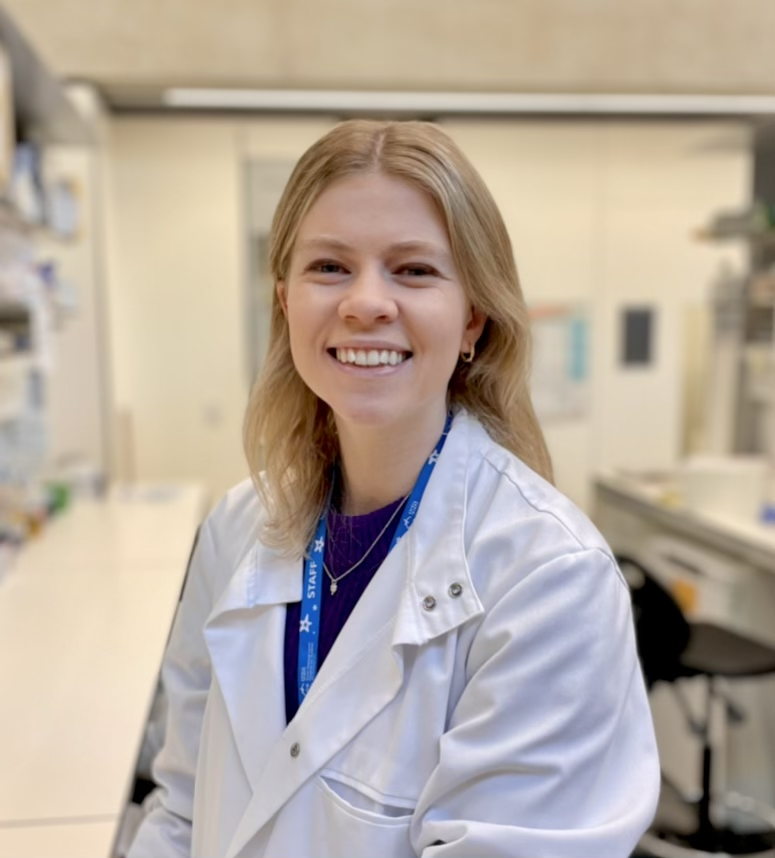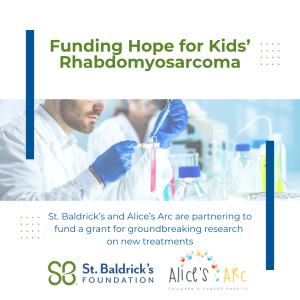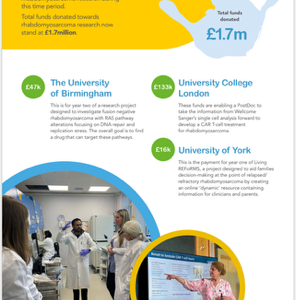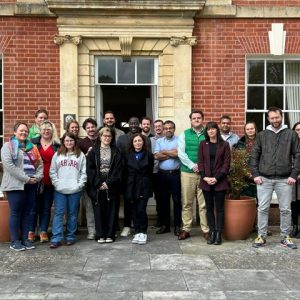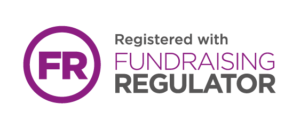Dr Christina Burke commented: The treatment options for rhabdomyosarcoma remain harsh, intensive and, in many cases, ineffective. With Alice’s Arc, we hope to translate the success of CAR T-cell immunotherapy to this childhood cancer. My goal is to understand how we can make this a reality, by identifying which cells might be interacting negatively in the tumour and forming strategies to overcome these.
Talk us through your typical day: Most of my day involves collecting or analysing tumour samples we receive from patient surgery, so that we can find out more about their biology. I have to be flexible, because these can come at short notice and it’s important we receive them as soon as possible. A small group of us at UCL Cancer Institute work together to analyse a single tumour in multiple ways, to maximise the impact of every single sample.
A lot of my work focuses on imaging tumours, which is demanding but really rewarding because it generates a ‘map’ of a tumour and gives us clues on how to target it with therapies (and it also produces nice pictures!). In between pipetting and troubleshooting, I try and attend seminars within our department to learn new things about what others in the building are working on too.
What big projects are you working on?
Our lab is focused on creating new genetically-engineered immunotherapies to target solid childhood tumours. As part of this, I am working on drawing together tumour sequencing data and images of the same tumour, to see what might be stopping immunotherapies from being successful in this environment. The more we know, the better chance we have at outsmarting the tumour when treating the patient.
My main goal is to use this information to design and create a more effective immunotherapy that I hope will benefit patients, specifically those with high-risk rhabdomyosarcoma, in the near future.
Your work in a tweet
Understanding the makeup of rhabdomyosarcoma for the design of kinder, tailored treatments #CAR-T #ChildhoodCancer
Why do you choose to work on this?
I like to work on science that I think will have a real impact on improving lives, and think this is especially relevant when working on childhood cancers. We work closely with patient advocates as part of our collaboration, called NexTGen, who remind us why new research and treatments are so desperately needed. It provides a lot of motivation at the end of a long day to keep trying.
Who do you collaborate with to deliver projects?
I’m funded by Alice’s Arc, where my priority is researching rhabdomyosarcoma. However, both my lab and the charity are closely involved with the global NexTGen project which aims to deliver CAR T-cell immunotherapy for multiple solid childhood tumours within the decade. This has given me the opportunity to work with collaborators from Children’s Hospital of Philadelphia, Children’s National Hospital in Washington, INSERM in Paris and many others, who are all dedicated to the same goal. I always come away from our meetings feeling inspired and like we are progressing towards making better childhood cancer treatments a reality.
What are you most proud of?
I love working on big problems, where there is so much to learn and to discover. I am proud knowing that because of my work on a patient’s sample, we have generated new knowledge that can help treat future patients.
What’s your favourite part of your job?
I really enjoy the creativity involved in designing new therapies, specifically by tweaking a patient’s own immune cells. It’s like putting together a jigsaw puzzle where lots of different pieces have to be considered – by the end of the process, not only have you created something new but you also have the potential to improve the life and treatment of a patient.
What do you do to wind down?
I’ve always loved music, and play whenever I can. I’m currently a percussionist in an orchestra in London which plays film music, that I really enjoy. My instrument collection is always growing – most recently I decided to learn the cello – though I am limited slightly by the size of my flat.
What are colleagues least likely to know about you?
I am currently completing the ‘Couch to 5k’ programme, having heard that so many of my colleagues will be running the half marathon for Alice’s Arc this October. I have been trying to keep it quiet until I’m fit enough to join in one day!
